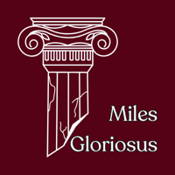
Overview
Synopsis
A scheme to reunite two young lovers and bring down an arrogant soldier drives Miles Gloriosus, the longest-surviving play by Roman playwright Titus Plautus. Pyrgopolynices, the play’s titular “braggart soldier”, has kidnapped Philocomasium, a young Athenian woman and lover of Pleusicles. Pyrgopolynices also kidnapped Pleusicles’ former slave, Palaestrio. Palaestrio and Pyrgopolynices’ neighbor, Periplectomenus, devise a scheme to trick Pyrgopolynices and free both Philocomasium and Palaestrio. This ensemble comedy is a fun exploration of ancient Roman theatre and comic stock characters: the cunning servant, the boastful soldier, the parasite, and the young lovers.
Show Information
Context
Plot
Characters
| Name | Part Size | Gender | Vocal Part |
|---|---|---|---|
|
Lead |
Male |
Non-singer |
|
|
Lead |
Male |
Non-singer |
|
|
Supporting |
Male |
Non-singer |
|
|
Supporting |
Female |
Non-singer |
|
|
Supporting |
Male |
Non-singer |
|
|
Supporting |
Female |
Non-singer |
|
|
Supporting |
Female |
Non-singer |
|
|
Featured |
Male |
Non-singer |
|
|
Featured |
Male |
Non-singer |
|
|
Featured |
Male |
Non-singer |
|
|
Featured |
Male |
Non-singer |
|
|
Featured |
Male |
Non-singer |
Songs
A song with an asterisk (*) before the title indicates a dance number; a character listed in a song with an asterisk (*) by the character's name indicates that the character exclusively serves as a dancer in this song, which is sung by other characters.
Monologues
Scenes
Key Terms
A dramatic device where a character speaks directly to the audience or to themselves, unheard by other characters onstage.
A performance technique where an actor speaks directly to the audience, breaking the fourth wall for dramatic or comedic effect.
A group of performers who function as a unit in a production rather than as individuals with leading roles.
An introductory speech or scene that sets up the context or themes of a play. Prologues are commonly used in classical drama to prepare the audience for what follows.
A classical genre featuring stock characters, mistaken identities, and satire, influential in Western dramatic traditions.
Recognizable character types used across theatrical traditions, such as the fool, villain, or ingenue.
Videos
Sorry! We do not currently have videos for this guide.
Quizzes
Themes, Symbols & Motifs
Sorry! We do not currently have learning modules for this guide.
Quote Analysis
Sorry! We do not currently have learning modules for this guide.
